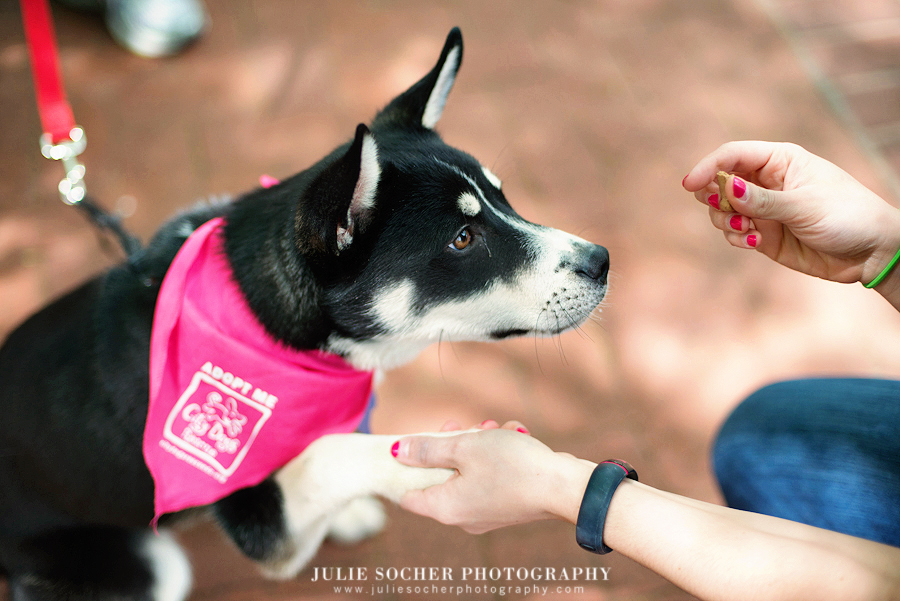 By Lisa Gabrielson It was my worst nightmare- I had left my 20-lb mix breed dog, Blaze, at my aunt’s house when out running errands. In a panic, Blaze got out of the house and ran off looking for me. He was lost in an unfamiliar, rural area too far from our own home for him to return there, and he was still missing as the sun went down that evening. He was last spotted headed into a heavily wooded area known to have coyotes and fisher cats. As the first day of searching came to an end, we started to look elsewhere for ideas. That’s when we hired a tracker and her dog. When Blaze initially went missing, we did everything we were supposed to do: we created flyers and posters, left our dirty clothing outside so he could find his way back by scent, we trekked through the woods and neighborhoods calling his name and shaking bags of treats, posted on facebook and craigslist. Advice poured in from other City Dogs Rescue alumni. But, because Blaze was lost in an area he wasn’t familiar with we were particularly concerned that he wouldn’t follow his own trail back to the house- after all, he had run away from there trying to find me, and knowing that I wasn’t at the house we thought he may not try to come back. So, we hired a tracking dog to come look for him the next morning. Barbara and her black lab, Casey, specialize in tracking cats and dogs. Casey is able to track humans, too; as Barbara pointed out to me, dogs have the ability to track pretty much anything, you just have to train them how to do it and train yourself how to read them. Within minutes of getting out of the car from Blaze’s last sighting, Casey had picked Blaze’s scent up off of his bed, which I had put into a garbage bag about 2 hours after he went missing in order to preserve the strength of his scent. She began tracking all around the neighborhood, under a porch where I believe Blaze might have spent the night and back into the woods behind a neighbor’s house. Based on the way Casey was pulling against her leash, we knew she had a strong and likely very fresh trail. We were headed back in the direction of the house, Casey began to pull harder and harder and we jogged behind her through the woods as best we could. She was on his trail, and even the humans sensed that we were getting close. About a quarter of a mile from the house, my aunt called to alert us that Blaze arrived on the porch just moments before. We were less than ten minutes behind him with the tracker, and clearly on the same trail that we had followed home. While the tracker didn’t find Blaze, we certainly succeeded in ‘herding’ him back towards the house, and certainly were on his trail. Had Blaze not been moving in the direction of the house, I have no doubt we would have caught up to him in very short order. Thank you to Barbara, and her black lab Casey, for helping return my sweet Blaze! If you’re in the New England area, I highly suggest you save the contact information for Barbara Costa (860-917-7367) and Marjorie Lineweber - (860) 460-2447. Marge, is a certified MAR Technician and owner of a dog training and daycare center. She referred us to Barbara who was able to come help us track Blaze the next day. CDR notes: Carlyn Kuder, a volunteer who is amazing at helping us find CDR dogs when lost in DC, recommends Sam Connolly of Pet Gold Trackers if you lose your dog in the DC area. "I am very proud of how supportive our team was [for Blaze]," Kuder said. "The time people spent posting on lost dog pages and making the poster for her - Patricia Kennedy, Kimberly Raue, and Carmen and I'm sure there are others. "When the unfortunate happens," she added, "we do have a great team that mobilizes and even long distance can help in bringing a lost dog home."
5 Comments
Thanks to the addition of part-time help. we are now going to have permanent office hours Tues, Wed, Thurs, Friday 4PM - 8PM and one weekend day (to be determined) at our offices at Quaker House, 2121 Decatur Place NW, Washington, DC (Dupont Circle).
During office hours, fosters can pick up heartworm and flea medications, fosters and adopters can return or pick-up crates and "adopt me" vests/bandanas, and people can purchase CDR merchandise. You can email our Office Coordinator, Yolanda Adenike, at admin@citydogsrescuedc.org or call 202-241-2221 (answered only during office hours). OregonLive.com offers a handy guide to teaching kids appropriate behavior around dogs to prevent dog bites.
"Dogs are also more likely to attack if they feel their food or home territory is being threatened. That's why it's so important that people – and especially children – should never approach a dog that is sleeping, eating, chewing on a bone. The same is true for dogs that are behind a fence, tethered in a yard or inside a car. Approach a dog only if the owner is present, and never leave children alone with pets unattended. Kids tend to be more at risk for being bitten because they typically approach animals fearlessly rather than cautiously, Dr. Katherine Miller, director of ASPCA Anti-Cruelty Behavior Research says, and their movements are more abrupt and less gentle than those of adults. "It's important to first ask permission of the owner if it's OK to pet the dog, and then ask the dog for permission," Miller says. Do that by putting your hand out with palms are facing upward; a palms-down position may indicate to the dog that you intend to strike. If the dog seems open to being touched, don't pet the top of its head, which canines also interpret as aggressive. Instead, reach for Fido's chest, the front flank where the legs meet the chest, or its shoulders. Children are also smaller, "so they're right at eye level with dogs and often stare directly at them, which is a threatening gesture to a dog," Miller says. If you have a dog with aggressive tendencies, train him to wear a basket muzzle(not a sleeve muzzle, which prevents panting and should be worn only briefly). You may feel uncomfortable, but it's better to be safe than sorry." Read the full article on Oregon Live here. After Hurricane Sandy in 2012, the American Society for the Prevention of Cruelty to Animals (ASPCA) teamed up with the Federal Emergency Management Agency (FEMA) to recognize the need for pet owners to have an emergency plan in place for their pets.
According to the ASPCA, the following are some easy steps to make ensure the safety of your pet in case of an emergency or natural disaster: 1. Have a Plan. Make sure your family’s plan includes how you will transport your animal(s) in an evacuation, possible routes you will take and your destination/sheltering options. Practice that plan at least yearly and share it with your family and friends. 2. Build an Evacuation Kit. The Kit should include the supplies you will need for your pets, including a photo of your pet, medical records, vaccination records, and any special food or prescriptions. This kit should be clearly labeled and easy to carry and records should be kept sealed or made waterproof. Make sure that everyone in your family knows where it’s kept. Update your kit each time you change your smoke alarm batteries so it’s easy to remember. 3. Stay Informed. Keep an eye on the weather, follow a projected storm’s path and don’t get caught unprepared. Staying informed also means knowing which shelters house both people and pets, monitoring possible road closures and having alternate travel plans. 4. Know Your Neighbors. It’s best to form a relationship with your neighbors well in advance of a disaster situation. Develop a telephone tree and determine who is home and when. If a disaster occurs while you’re at work, your neighbor may be the only one who can reach your pets. 5. Vaccinate and Microchip. If you’re ever required to shelter your pets, you’ll want them protected against disease. And the single most important piece of advice we can offer is to microchip your pets. It is truly their ticket home. Check out this video on Pet Preparedness Day from the FEMA Deputy Administrator. http://www.fema.gov/media-library/assets/videos/75356 What should you have in your pet’s emergency evacuation kit? The ASPCA recommends these items:
Visit http://www.aspca.org/pet-care/disaster-preparedness for more information and tips for pets other than dogs or cats. More information on caring for animals in case of disaster can be found here http://www.ready.gov/caring-animals And here: http://www.fema.gov/media-library/assets/videos/78847 |
Archives
November 2023
AuthorCity Dogs Rescue & City Kitties volunteers. Categories
All
|
|
About Us
City Dogs & City Kitties Rescue saves adoptable dogs and cats in overcrowded and high-kill shelters, where resources are severely limited. We offer a lifeline to as many of these wonderful pups and kitties as possible. City Dogs & City Kitties Rescue 1812 1/2 11th St NW Washington, DC 20001 Administrative Office Hours: We are not a shelter and do not accept animal surrenders at our location, nor do we have adoptable animals onsite. All of our adoptable animals are in private foster homes. Due to COVID-19 we have closed traditional office hours. Visit our contact page for information about foster supply pick up. City Dogs Rescue has federal tax exemption under Section 501(c)(3) of the Internal Revenue Code, effective September 21, 2011.
Click to set custom HTML
|
FOUNDING SPONSORS
Gold Sponsors
Silver Sponsors
|
Proudly powered by Weebly


 RSS Feed
RSS Feed



